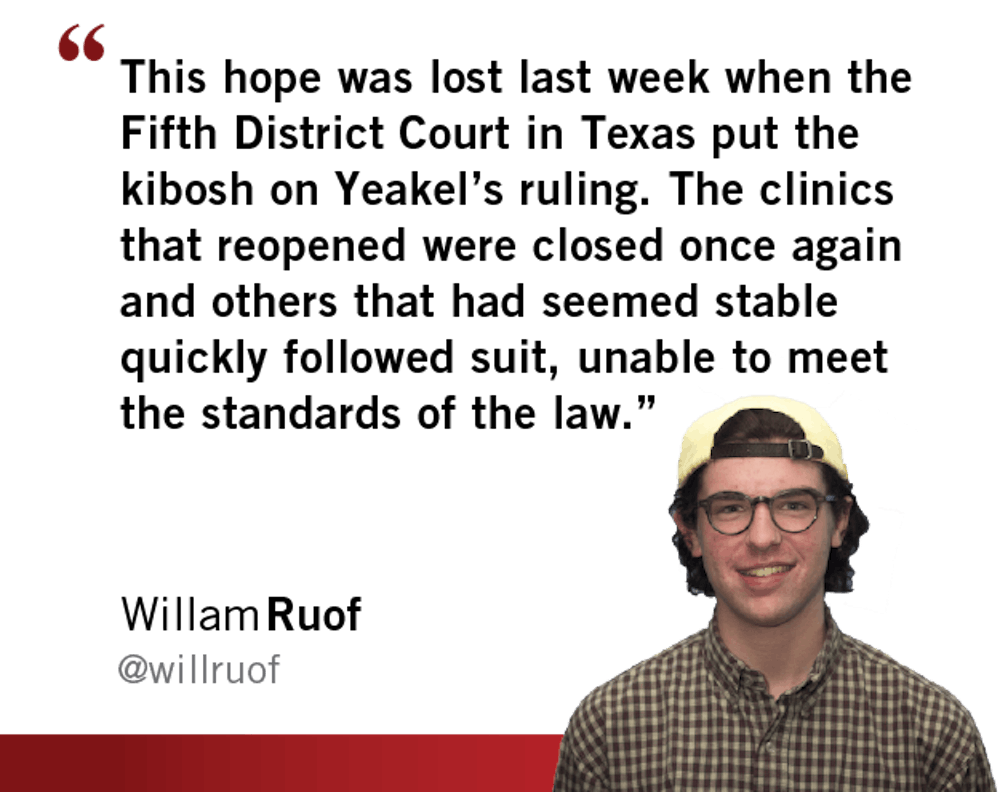In July 2013, Texas’s House Bill 2 was signed into law. This bill required all abortion clinics to meet requirements so stringent that the number of operating clinics has dropped from 44 to eight.
One of the main problems with the bill is that it requires all abortion clinics to adhere to the same health standards and building codes as ambulatory surgical centers, or ASCs. It is estimated that most clinics would have to spend $1 million or more to meet these standards, so of course a majority of centers that offer abortion care cannot afford to stay open.
The bill also requires all abortion doctors to receive admitting privileges at all hospitals within 30 miles of their clinics, but come on — how likely is assent? This is Texas we’re talking about — not exactly known for its acceptance of a woman’s right to abortion.
In August, the bill was challenged in the District Court of Austin, and Judge Lee Yeakel ruled that it is unconstitutional to force clinics to adhere to ASC standards. By the time he reached this decision, the number of abortion clinics throughout Texas had already dropped to 20, but it seemed as if there was hope: Some of the previous clinics had been able to reopen.
This hope was lost last week when the Fifth District Court in Texas put the kibosh on Yeakel’s ruling. The clinics that reopened were closed once again and others that had seemed stable quickly followed suit, unable to meet the standards of the law. As of now, the remaining clinics are located in Dallas, Houston, Austin, San Antonio and Fort Worth, leaving much of West and South Texas without abortion care.
The McAllen clinic, in Rio Grande Valley, had been providing abortion services to women for 40 years before it was forced to close as a result of House Bill 2. The CEO of Whole Woman’s Health, Amy Hagstrom Miller, stated that all appointments made for the month of October had to be cancelled.
She said, “Our staff is having to inform all the women who had appointments this weekend that we’re not able to see them for the abortion service.”
The loss of this clinic is devastating, because the next closest location for the people of South Texas is in San Antonio, which is farther away than some women can manage to travel.
While Texas isn’t the only state in which rights to abortion are limited, it is the state with the second highest population in the country, and it is unsettling that, in one of the most populous states, abortion is often only an option for those with enough money to travel to clinics and pay for treatment. House Bill 2 has disproportionately affected the lower class women of Texas, making it nearly impossible for them to seek an abortion.
It’s long past the time to end these harsh restrictions on abortion. At what point will women get to make this extremely personal decision without the overreaching meddling of a government predominately run by males? The fact, that Texas has made it infeasible for a portion of its population to seek abortions is disappointing, though not shocking. Once again, governing intent takes precedence over individuals’ rights.
Reach the columnist at William.Ruof@asu.edu or follow him on Twitter @willruof
Editor’s note: The opinions presented in this column are the author’s and do not imply any endorsement from The State Press or its editors.
Want to join the conversation? Send an email to opiniondesk.statepress@gmail.com. Keep letters under 300 words and be sure to include your university affiliation. Anonymity will not be granted.
Like The State Press on Facebook and follow @statepress on Twitter.





